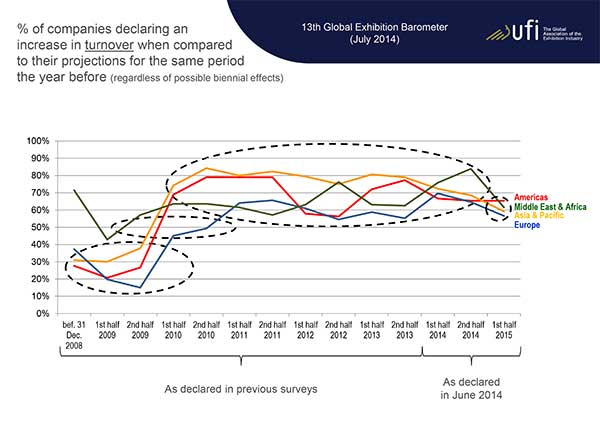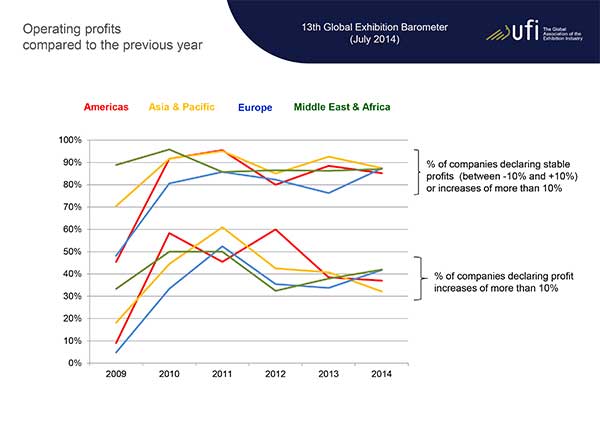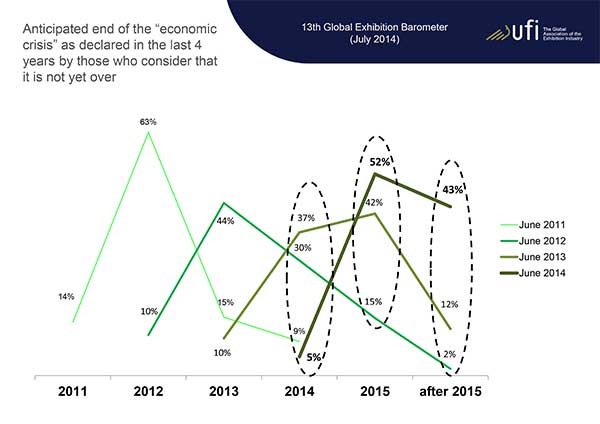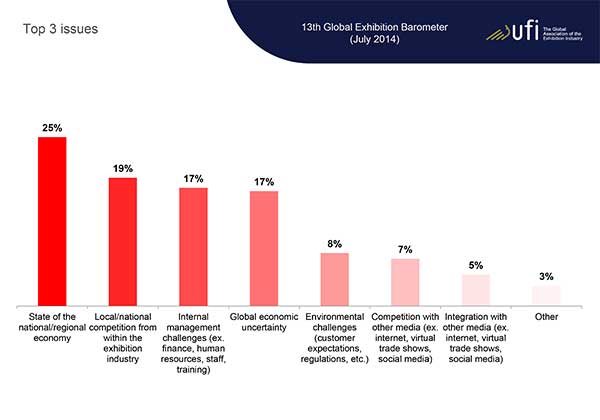Since 2009, UFI has regularly assessed the impact of the economic downturn by developing a “Crisis Barometer” based on the perceptions of UFI members. Put forth by The Global Association of the Exhibition Industry (UFI), the 13th Global Exhibition Barometer includes survey results on gross turnover, operating profits, perceptions of the economic crisis and some of the most important business issues.
At a global level, the situation appears solid with a majority of companies declaring an increase in their turnover. Almost one company out of two declared an increase of annual profit of more than 10 percent since 2010. However, 56 percent of the respondents declare that the impact of the “economic crisis” on their business is not yet over, though most anticipate its end in 2015.
As to the general economic climate, replies received to the question on “the most important business issues” where the “state of the national/regional economy” and “global economic uncertainty” have been consistently selected as among the three most important business issues for the past four years. “Local competition” and “internal management challenges” were also considered significant.
At the national level, significant variations are noted:
- A relative slowdown is expected in China where indicators still remain positive: 25 percent of respondents declared an increase of 10 percent of their annual profit for 2014, compared to 52 percent for 2013. Seventy-two percent believe that the “economic crisis” is now over, or will be by the end of 2015. Environmental challenges are also high on their list of issues.
- The general outlook is more positive in the U.S. where 50 percent of respondents project an increase of more than 10 percent of their annual profits in 2014 and 80 percent of respondents anticipate an increase of turnover in the coming year. Seven companies out of 10 in the U.S. declare that the impact of the “economic crisis” is now over.
- In Europe, Germany and Russia show contrasted results: 53 percent of respondents in Germany, but only 13 percent in Russia, project an increase of more than 10 percent of their annual profits in 2014. One company out of two in Germany, but only one in five in Russia, declare that the impact of the “economic crisis” is now over.
Conducted in June 2014, results were combined with those of previous surveys for the 2008-2015 period.
Gross turnover
Surveyed was the evolution of participants’ turnover expectations for 2014 and the first half of 2015 as compared to their expectations during the same period the year before, regardless of possible biennial effects.
- The outlook since 2011 remains positive with a majority of companies in all regions declaring turnover increases and projections indicate that this is expected to continue in the coming year.
- An average seven companies out of 10 in all regions declare increases for 2014, except in the Middle East and Africa where eight companies out of 10 do. A slight slowdown is currently anticipated for the first of 2015, with only six companies out of 10 from all regions declaring an increase of their turnover.
- When looking at detailed country results for the coming year:
— An average eight companies out of 10 declare increases in the U.S.; seven out of 10 in Germany, Turkey and South Africa; six in China; and five in Russia. For Singapore, this rate appears to change from nine companies out of 10 for the second half of 2014 to only five for the first half of 2015.
— It should be noted that a significant level of uncertainty exists in several countries for the projection in the turnover for the first half of 2015: 33 percent in Singapore, 29 percent in Turkey, 27 percent in Russia and 25 percent in China.
 Operating profits
Operating profits
The results show that:
- Roughly four companies out of 10 in all regions declare an increase of more than 10 percent in annual profits in 2013 and 2014. These results apply to the three major national markets where a large number of answers were received: 50 percent in Germany and in the U.S. and 41 percent in China;
- When looking at detailed country results, changes can be identified for several countries:
— The situation between 2013 and 2014 improves significantly in the U.S. (from 22 percent to 50 percent) and Turkey (from 14 percent to 62 percent) and slightly in South Africa (from 33 percent to 39 percent) and Germany (from 46 percent to 53 percent)
— The situation appears to slowdown in Russia (from 70 percent to 13 percent) and China (from 52 percent to 25 percent) and, to some extent, in Singapore (from 66 percent to 57 percent).

Perceptions of the economic crisis
Companies were asked their views on whether the impact of the “economic crisis” on their business was over or not. Replies from eight previous surveys were combined.
Around one company out of two from all regions except in Europe now considers that the “economic crisis” is over. In Europe, only three to four companies out of 10 do.
The number of companies that believe that the crisis will end in 2015 has increased from 42 percent a year ago to 52 percent. Forty-three percent now believe that the impact of the economic crisis will only end after 2015.
When looking at detailed country results, different levels of optimism appear with respondents declaring that the impact of the “economic crisis” on their business is now over: 86 percent in
Singapore, 70 percent in the U.S., 50 percent in China or Turkey but only 47 percent in Germany, 40 percent in South Africa, 36 percent in China and 18 percent in Russia.
Results of this survey were initially published in February, May and August 2009. This report evolved as the “Global Exhibition Barometer” with two surveys per year. The last reports were issued in January and July 2010, 2011, 2012, 2013 and in January 2014.
Most important business issues
As in the earlier Global Barometer Surveys, companies were asked to identify the three most important issues for their business in the coming year from a proposed list of seven issues.
The results are remarkably stable in all surveys. In the current survey, 25 percent responded “State of the national/regional economy,” 19 percent responded “Local/national competition from the exhibition industry,” 17 percent responded “Internal management challenges” and 17 responded “Global economic uncertainty.”
Considered as less critical in business were “Environmental challenges (customer expectations, regulations, etc.)” and “Other media” issues – “Competition from other media (ex. internet, virtual trade shows, social media)” or “Integration with other media” (ex. internet, virtual tradeshows, social media).
When looking at detailed country results, the four main issues identified at global level remain the same, except in China, where the “Environmental challenges” join the top four issues with 15 percent of answers and also appears very close to the other top three main issues at 20 percent each.
UFI members in 84 countries participated in the survey. For the U.S., an identical survey is conducted by the Society of Independent Show Organizers. The scope of the survey has since been broadened to include members of Asociacion International de Ferias de America (AFIDA) in Central and South America, and of Exhibition and Events Association of Southern Africa (EXSA).































